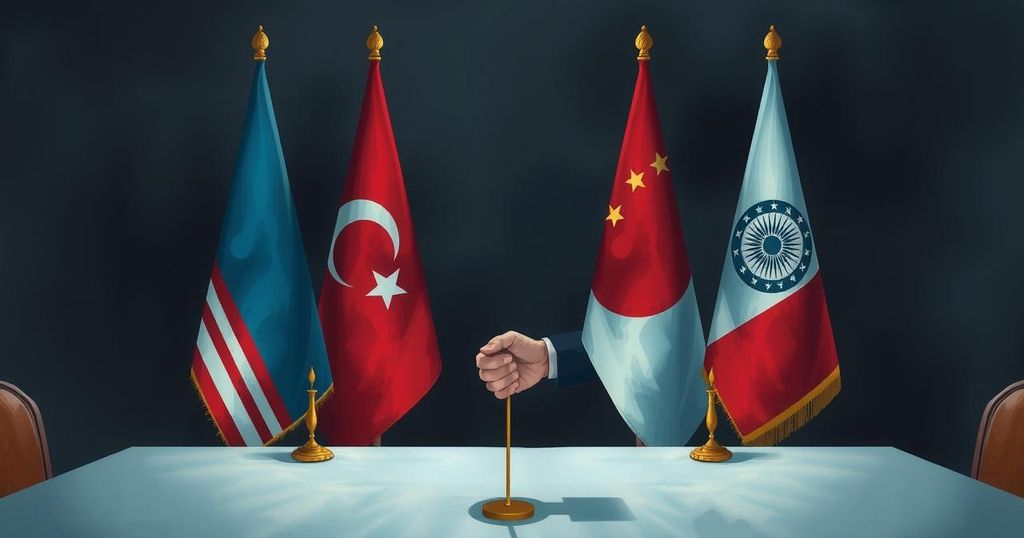World news
AMERICA, ASIA, CARLSON, DAN CALDWELL, DEPARTMENT OF DEFENCE, EUROPE/ASIA, FIRST, FOX NEWS, HEGSETH, IRAN, ISLAMIC REPUBLIC OF IRAN, ISRAEL, JERUSALEM DISPATCH, MEDIA, MEDIA CRITICISM, MIKE WALTZ, MORRIS, NORTH AMERICA, PENTAGON, POLITICS, TEHRAN, THE PENTAGON, TRUMP ADMINISTRATION, TURKEY, U.S. ELECTIONS, U.S. PRESIDENTIAL RACE, UNITED STATES, US, WASHINGTON, WHITE HOUSE
Daniel O'Connor
0 Comments
Trump Allies Claim ‘Mossad Agents’ Sabotaging Iran Talks
Allies of Donald Trump allege that “Mossad agents” and “warmongers” are attempting to sabotage U.S. negotiations with Iran, with accusations of internal divisions within the administration becoming more pronounced. Key figures like Tucker Carlson and Clayton Morris highlight these tensions, especially in light of recent personnel changes at the Pentagon. Public sentiment towards Israel is shifting, indicating changing dynamics within Republican circles. Trump’s commitments seem at odds with traditional foreign policy approaches, as negotiations progress with Iran.
A mix of accusations and tense dynamics surround the ongoing discussions regarding the potential for a nuclear deal with Iran. Supporters of former President Donald Trump are alleging that “Mossad agents” and “warmongers” are attempting to steer the U.S. towards military conflict with Iran. Interestingly, these sentiments are not emerging from foreign entities but from some of Trump’s closest allies within the media.
Last week, Tucker Carlson—high-profile conservative commentator—claimed during his show that a senior Department of Defense official, Dan Caldwell, was dismissed for presenting a barrier to airstrikes against Iran. Caldwell’s removal earlier this month was reportedly tied to allegations of leaking classified details relating to Secretary of Defense Pete Hegseth’s use of Signal, according to various reports.
Carlson hinted during the segment that Caldwell’s position was undermined due to his unconventional views, remarking, “You did make maybe one career mistake by giving on-the-record interviews describing your foreign policy views…that are out of the mainstream among warmongers in Washington.” His remarks draw attention to the possible divisions forming over foreign policy within the Trump administration.
On Sunday, Clayton Morris, a former anchor with Fox News and current podcaster, asserted that pro-Israel factions are undermining Trump’s “anti-war team” at the Pentagon. He alleged that former Israeli Mossad agents are active in discrediting Defense Secretary Hegseth, though he did not specify their identities. The insinuation underscores the increasingly fraught relations among various factions of Republican influencers.
The Trump administration seems to be experiencing a split—traditional Republicans like Secretary of State Marco Rubio and national security advisor Mike Waltz are contrasted against the isolationist tendencies of figures like Susie Wiles and Tulsi Gabbard. This conflict highlights the evolution of Trump’s national security perspective, veering away from the party’s historical hawkish stance.
Particularly notable is the identification of Merav Ceren as a target for criticism. Ceren, who was appointed to oversee Iranian and Israeli matters at the National Security Council, has faced scrutiny for her background in Israel. Morris commented on her nomination, equating it with a broader trend among Republicans favoring dual citizens and former Israeli officials.
Public perception towards Israel appears to be shifting as well. A Pew Poll from April indicated that 53% of Americans now hold an unfavorable opinion of Israel—a noticeable increase from 42% in March 2022. This trend is especially prominent among younger Republicans who increasingly gravitate towards alternative media formats, engaging with figures like Carlson and Morris.
As Trump navigates the complexities of foreign policy, he seems entangled in contradictions about starting new conflicts in the Middle East. On Iran, remarks made by Steve Witkoff, a prominent envoy, expressed a willingness to entertain low-level uranium enrichment in Tehran, which drew backlash from pro-Israel voices. In response, he reversed course, insisting on a total cessation of their nuclear enrichment activities.
Ongoing discussions between American and Iranian delegates took place in Oman over the weekend, marking the third round of negotiations. Trump stated to reporters that these discussions are progressing favorably and, interestingly, emphasized the possibility of securing a deal without escalating military action, suggesting that, “We’ll have something without having to start dropping bombs all over the place.”
In summary, the rift between traditional Republican hawks and Trump’s isolationist supporters is growing increasingly apparent, particularly in the context of Iran negotiations. Accusations of foreign interference through pro-Israel individuals emphasize internal party conflicts. As public sentiment towards Israel shifts, Trump confronts the dual challenge of maintaining his foreign policy ambitions while appeasing various factions within his own camp. The continuation of discussions with Iran could signal a significant turning point, especially if they proceed without military escalation.
Original Source: www.middleeasteye.net




Post Comment